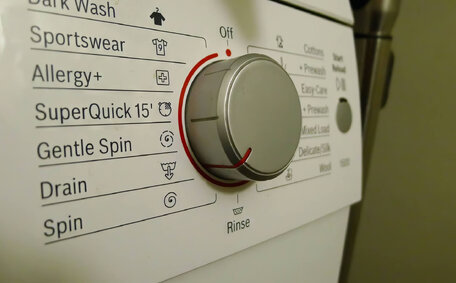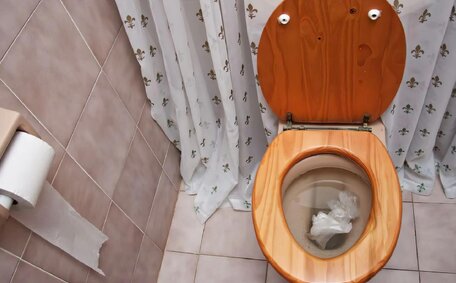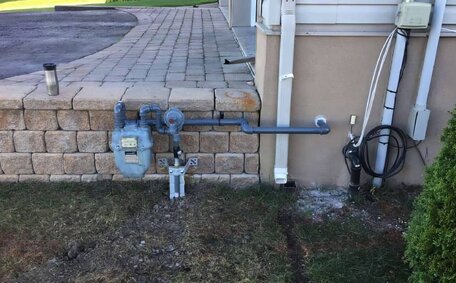Understanding Sewer Systems and Identifying Issues
Sewerage systems transport wastewater from residential and commercial properties to treatment plants. Heavy rain can lead to sewer drain backups as stormwater inundates the sewer pipes.
Maintaining your sewer line can prevent blockages and damage, averting sewer backups, overflows, and associated health hazards and property damage.
- Broken/cracked sewer pipes that roots can damage and leave blocked, contributing to sewer blockage causing a line blocked
- Stormwater and groundwater infiltration can also overload the system.
Regular inspection of cleanouts and piping mitigates the risk of blocked sewer obstructions. Avoid direct contact with any overflowing sewage and inform your insurance provider due to the substantial infection risks it poses.
Should an issue with your sewer lines arise, immediately seek professional assistance to prevent contamination and safeguard your family’s health and safety. Promptly identifying and addressing issues is crucial for maintaining a safely functioning system, ensuring hassle-free use of your facilities. Recognising signs your plumbing is experiencing difficulties, such as gurgling sounds, bad odours, wet spots, and backups, is key.
Detecting Blockages: Signs and Early Warnings
Be aware of several common signs that may indicate a potential blockage in the sewer main. Tardy draining sinks, tubs, showers, or floor drains may hint at a line hampered by a partial obstruction. If you notice a bad smell like an unexpected sewer gas coming from drains, especially inside the home, it’s a red flag.
gurgling noises from the main drain, and water pooling in your basement or your yard point to a blockage in the drain line.
Sewage backups often originate from tree roots damaging the house drain, or build-ups of fats, oils, grease, and foreign objects, such as wipes and paper towels, clogging the line. Neglected, small clogs in a sewer pipe can build up over time, becoming full blockages, and consequently have wastewater backed up through drains into house interiors.
Addressing these issues promptly, particularly those external to your home, is essential to ensure a quick and cost-effective solution before backups lead to damage and health risks. Monitor for early signs of blockages and seek help from a professional plumber immediately.
Preventing Future Blockages
There are several key ways to help prevent future sewer line blockages:
- Use sink strainers to catch food scraps and hair, preventing them from entering your drains.
- Avoid pouring fat, oil, and grease down the drain as they solidify and block pipes.
- Ensure that only toilet paper and human waste are flushed down the toilet.
- Use wet wipes and paper towels sparingly and never flush them
- Consider fixtures like low-flow toilets and water-efficient washing machines to reduce the burden on your sewer system
- Choose cleaning products safe for septic tanks, such as soap and water.
- Trim large trees close to your sewer lines to deter root intrusion.
Frequently seeking out products marked as “septic safe” and “sewer safe” can reduce the need for urgent repairs on your plumbing by breaking down waste and maintaining flow into your pipes. But Regular professional maintenance like pipeline inspections and cleanouts are key to keep your entire plumbing system running properly.
Remain vigilant in avoiding products known to clog pipes. Make sure you confirm what is safe to flush with your local water authority to ensure your pipes stay clear. Simple preventive measures can help you avoid catastrophic sewer line failures and backups.
Safely Attempting DIY Drain Cleaning
For minor clogs that don’t warrant significant plumbing problems, you may attempt to resolve the issue on your own but remember to check your drains with basic DIY drain cleaning before calling a professional. Exercise caution in these tasks, as a plumber can better mitigate health threats in the event of a sewage backup.
Using a Plunger
Discovering how unblock sink blockages is straightforward with a heavy-duty plunger, which can possibly dislodge obstructions such as hair, grease, or minor debris. Fill sink/tub with water to cover drain, submerge plunger, and plunge vigorously 15-20 times. The plunger compresses air to dislodge clogs—ensure the water doesn’t splash onto you.
Drain Snakes
A hand-operated crank or electrically driven auger can delve deeper to clear blockage that eludes simpler methods. Slowly twist the 4-10 foot cable down the pipe, pushing past the clog. Angle cable towards flow direction. Don’t use excessive force or scratch pipes. Ensure cable is fully removed afterwards.
Drain Cleaners
Only use chemical drain cleaners for sinks or tubs facing a complete blockage your regular methods can’t clear - and never in toilets. After waiting the instructed time, run hot water for several minutes to flush any remaining debris.
Ensure you wear gloves and eye protection while handling chemicals. Use products that will work your pipes effectively, specifically those made for plastic if applicable, for their intended purposes only. Improper use can easily result in chemical burns or pipe damage.
However, drain cleaners often falter against major clogs, including those from oils grease accumulations and roots. They can be highly caustic, producing toxic fumes. Only apply according to manufacturer instructions - never mix products. Attempting to clear your main pipeline blockages carries risks of contamination and injury.
When grappling with major or persistent dilemmas such as main sewage line troubles, bypass the DIY methods and let a plumber fix the issue. They have specialised equipment to diagnose issues and advanced methods to clear blockages without damaging pipes.
Professional Drain Cleaning Services
Professional drain cleaning services are valuable for recurring drainage issues, severe blockages, or overflows. Specialised equipment such as high-powered water jets and professional drain snakes enable plumbers to effectively dislodge tough clogs and repair sewers, removing tree roots and other obstructions. They also inspect pipelines using cameras to identify damage or other items needing repair.
By mapping pipe routes and diagnosing flow issues, professionals can develop long-term solutions. Without proper experience, attempting to roto-root or pressure-clean drains risks damage, contamination, and injury.
Our licenced, bonded, and insured technicians at Padstow Plumbing have the tools and expertise to quickly clear any stubborn drain blockages and get your system running properly again.
We offer 24/7 emergency plumbing services in Padstow and surrounding suburbs. Call us at 1300 349 338 or email [email protected] for affordable and reliable sewer cleaning and repairs.
Replacing or Repairing Damaged Pipes
Replacing or repairing your sewer line becomes necessary when a blockage can lead to cracks, breaks, blockages, or root infiltration causing chronic drainage issues or sewage backups. Left unaddressed, sewage backup, leaks and sewage overflows can result in health hazards, property damage from flooding, and environmental harm.
Before undertaking repairs, have a professional plumber diagnose the specific damage. Factors like pipe materials, such as cast iron, location, severity of cracks/breaks, and root overgrowth determine whether spot repairs, pipe relining, or complete replacement is needed.
Pipe Replacement
In some cases, for widespread damage such as collapsed pipes, significant portions of cracked pipe, or conduits irreparable from root damage, complete substitution is necessitated. Professionals will excavate to access pipes, remove damaged portions, replace with new piping, reconnect, and backfill the ground.
Pipe Repair Options
For less extensive damage or a damaged blocked pipe, trenchless techniques such as pipe relining can seal fissures and bolster integrity, which can extend the lifespan of your pipes. Epoxy coatings are applied internally or a resin-saturated liner pushed through the pipe to form a smooth, leakproof barrier.
Localised spots repairs are done by accessing damaged sections through cleanouts. Patches or seals are fitted to fix small holes or cracks. Pipe bursting can replace pipes without large excavations.
A professional assessment determines the right approach for addressing your sewage system and the endured stress. Delaying vital sewer repairs risks contamination, property damage from sewage backups, and may damage your property further.
Legal Responsibilities for Sewer Management
As a property owner, you have legal responsibilities for properly maintaining your private sewage system to prevent health hazards or environmental damage. This applies whether your homes sewer system has been affected or whether you’re connected to the council sewer system.
For your septic system and main sewer connections, most councils require scheduled systems to be pumped out and inspections every 3-5 years by licenced plumbers to ensure proper functioning. Upgrades, repairs, or replacements must adhere to regulations on system siting, materials, and process water disposal.
If your system is linked to the city sewer, it’s crucial to ensure your sewer plumbing permits proper wastewater flow, safeguarding your water supply without leakages, blockages, or illegitimate stormwater connections that could inundate the network. Licenced plumbers should do any repairs or modifications to your homes’ wastewater plumbing.
Inadequate onsite wastewater management leading to sewage overflow, environmental contamination, or residential surges can incur penalties and responsibility for mitigation and repair costs. In such events, it’s critical to contact your sewage professionals. Learning about the specifics of your wastewater system and regulations can be done through local council outreach programmes or by contacting your water authority.
Engaging your plumber for qualified installation, maintenance, and repairs is essential to meeting legal obligations. When issues occur, consult an expert for a diagnosis to take the appropriate action that restores proper function and avoids additional damage or penalties.
Personal Safety When Handling Sewage
When handling raw sewage, can create severe health hazards. Avoid health risks and contamination by taking precautions when doing DIY drain cleaning or spill cleanups.
Protective Equipment
Don protective clothing such as waterproof gloves, boots, overalls, and goggles when addressing any sewer-related issue. Rinse gloves before removal and wash hands thoroughly afterwards with antibacterial soap, and be sure to wash your work clothes, paying particular attention to the affected area.
Ventilation Precautions
Sewage gives off toxic gases that pose a major health hazard and can be fatal in confined spaces. Open outside doors and windows to ventilate, use exhaust fans, and place a fan near the workspace.
Tetanus and Other Vaccinations
Have an up-to-date tetanus shot before sewage contact.
Consider vaccinations for Hepatitis A and B if you suspect your exposure will be extensive.
Safe Work Practises
Carefully remove drain covers and lids; hazardous gases may be trapped. Never immerse your hands up into drains or pipes; utilise instruments to excavate detritus. After you clean up a sewer spill, take a shower promptly using hot water, soap, and bactericidal cleansing agents.
Keep clothing, materials and tools away from contamination. Securely bag all waste before disposal. Thoroughly cleanse any exposed skin and dispose of contaminated clothing.
Extreme vigilance is advocated for non-professionals aiming to deal sewage concerns. The infectious disease risks warrant comprehensive precautions. For major blockages or overflows, rely on licenced plumbers with extensive training in safe handling procedures.
Environmental Impact and Solutions
Improperly managed sewage systems can not only affect the environment but also public health.
Untreated sewage your wastewater management system handles often contains chemicals, nutrients, and pathogens harmful when released into ecosystems. It contributes to algal blooms and depletion of oxygen in waterways, killing aquatic life. Sewage also introduces bacteria that make water unsafe for recreation or drinking.
Overflowing sewer drains breed noxious gases like hydrogen sulphide, problems which can occur and cause offensive rotten egg odours that can afflict neighbourhood tranquillity. Ruptured pipes and faulty septic tanks leach contaminants into groundwater, also used for drinking supplies in many areas.
We all share the responsibility to mitigate these problems. Never pour fats oils like used cooking oil or harsh cleaners down drains. Compost food waste when possible.
Actions like using phosphate-free and low-sodium laundry detergents and soaps help curb nutrient runoff. Actions like using phosphate-free and low-sodium laundry detergents and soaps help curb nutrient runoff.
Have older septic tanks inspected and ensure your septic tank is upgraded to current standards if needed. Confirm your home’s plumbing and private sewer lines don’t leak or illegally connect to storm drains. Communicate any spills, leaks, or contamination issues to your health department or local water authorities to ensure a swift response.
Collaborating with agencies like environmental health and water utilities allows coordinating system improvements, public education, and rapid response protocols when overflows occur.
This protects local waterways while ensuring community wastewater needs are sustainably managed. We all benefit from properly functioning sewage infrastructure. Pitching in to use best practises makes a difference.






